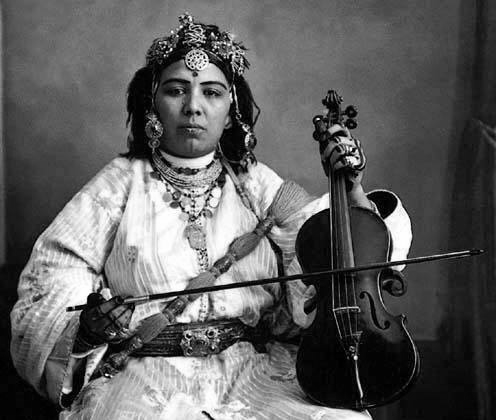Kharboucha & Aita Music
The Aita Mon Amour duo, Widad Mjama (who we hosted on the NYUAD Arts Center Podcast) and Khalil EPI (who we hosted on Quartertones) opened up our eyes to the Aïta musical tradition of Morocco. This powerful genre, rooted in resistance and social justice, has been shaped by voices like Kharboucha, a true Moroccan heroine whose music became a symbol of rebellion against injustice.
Kharboucha was born towards the end of the 19th century in the tribe of Oulad Zayd in the region of Abda, and was known for her fearless performances that spoke directly to the struggles of the rural Moroccan people. Born Hadda Al-Ghita, she was also called Hwida, but is better known as Kharboucha due to the scars on her face. Despite being illiterate, she became a powerful poet and performer, using her voice as a weapon in a time of repression.
She led a resistance in her tribe against the tyrannical Caïd Aïssa Tamri ben Omar, using her poems and songs to denounce the social injustices and crimes committed by the oppressive rulers of her time. Her songs became a rallying cry, exposing exploitation, land seizures, and political betrayal. She did not speak from privilege, but from within the everyday pain and dignity of her community. Kharboucha's songs became a means of mobilizing the population, and her defiance eventually led to her capture. According to oral tradition, she was forced to sing for the Caïd, who wanted to humiliate her. Instead, she sang a provocative poem that exposed his crimes, driving him into a fit of rage. As punishment, she was buried alive—singing her final verses until the very end. Her death became legend, turning her into a martyr of the people.
Even after her death, her legacy lives on as a symbol of strength, resilience, and cultural pride in Morocco. Though the exact date of her death remains debated, many believe she died around 1895—not 1981, as is sometimes mistakenly cited. What endures is the power of her story and the echoes of her voice through generations.
Kharboucha was one of the pioneers of the Aïta genre, with her music depicting the lives of Moroccan women, anti-colonial resistance, and a desire for political rights. Her legacy has inspired countless writers and artists, including a film released in 2002. Today, artists like Widad and Khalil continue to honor this rich tradition, breathing new life into its rhythms and messages of resistance.
Her legacy has inspired countless writers, musicians, and performers. In 2002, her story was adapted into a film by Moroccan director Hamid Zoughi. Today, artists like Widad Mjama and Khalil Epi continue to honor this rich tradition, blending heritage with contemporary sounds, and breathing new life into her rhythms and messages of defiance.





